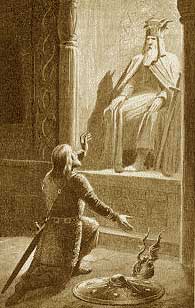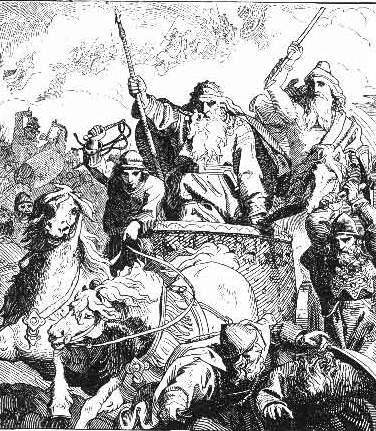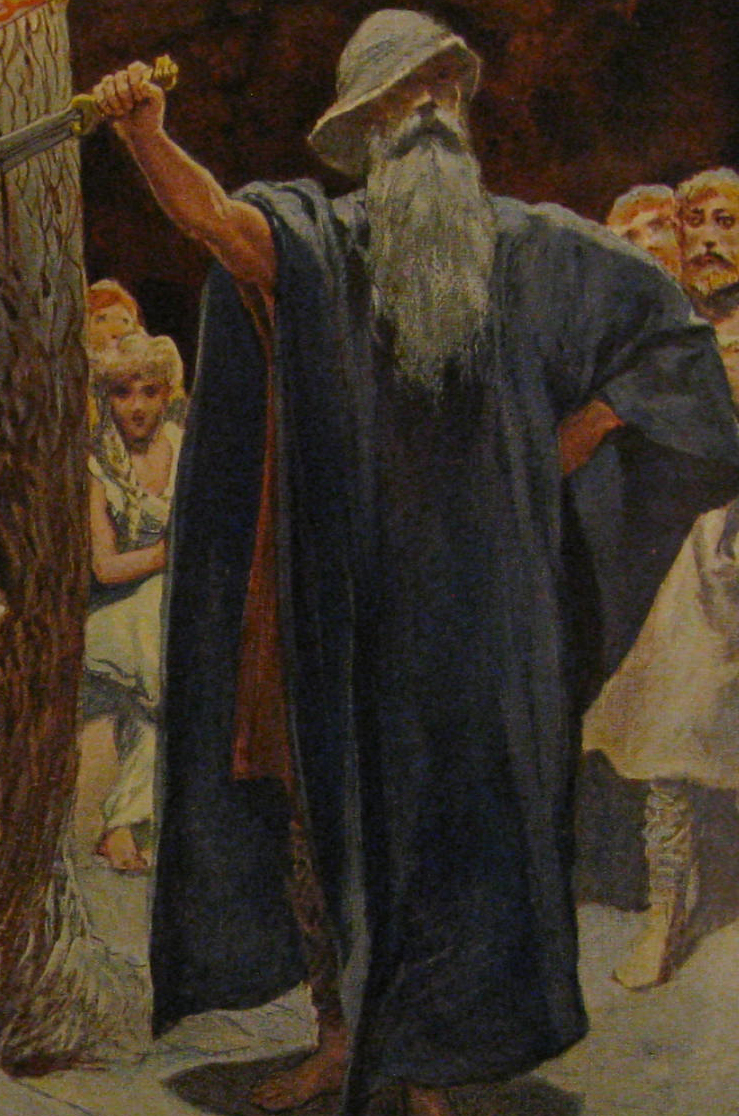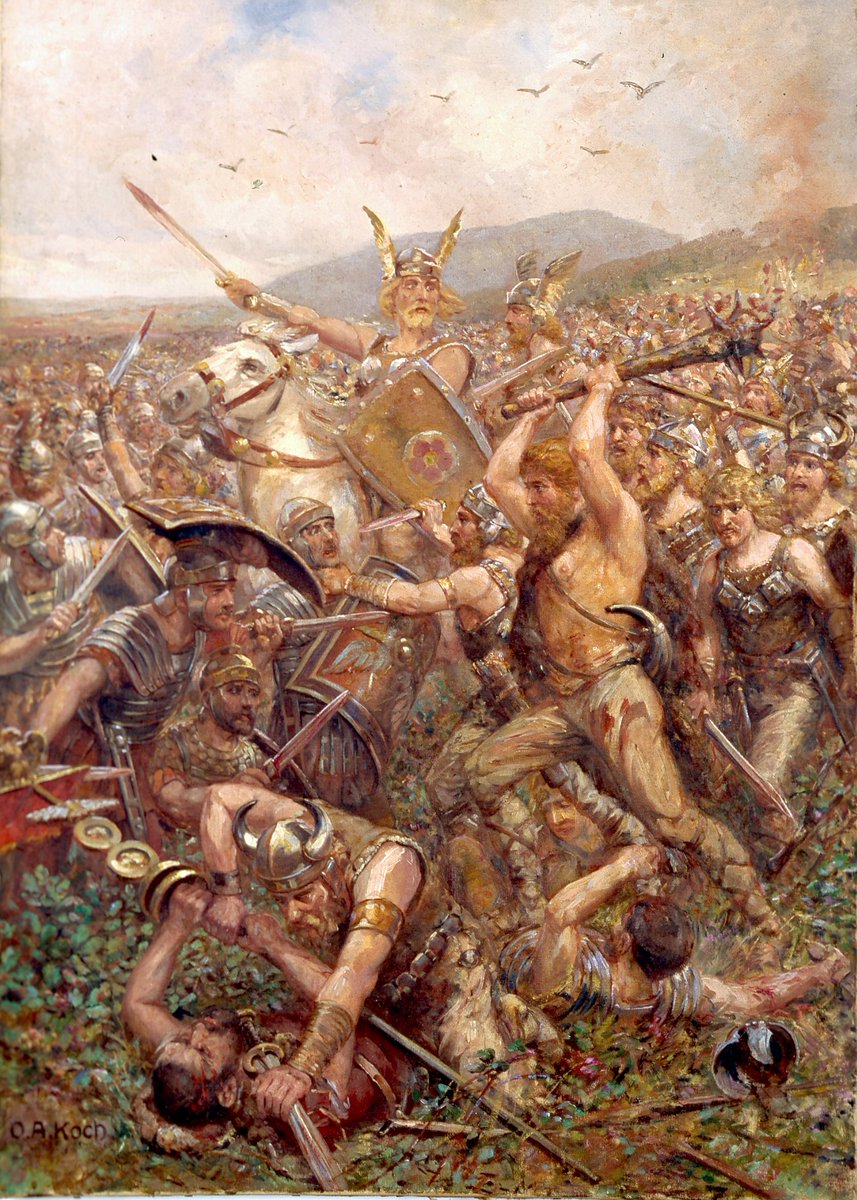Afraid are your hosts, fey is your leader
You have angered Óthin: we offer you battle.
On the downs of Dun-heath and in Dylgia-vales
I bid you battle, ’neath the Iassar-fells’ brow.
May Óthin o’erawe Angantýr’s foes
and may this spear fly o’er you as I do bid it.
-Hlöðskviða
You have angered Óthin: we offer you battle.
On the downs of Dun-heath and in Dylgia-vales
I bid you battle, ’neath the Iassar-fells’ brow.
May Óthin o’erawe Angantýr’s foes
and may this spear fly o’er you as I do bid it.
-Hlöðskviða
The Geatish king Gizurr inviting the Huns to come fight the Goths. Hloth(half brother of Gothic king Angantyr) wants to attack Gizurr, who rode up to the Huns and shouted this, but the Hun king Humli refuses, because it is dishonorable to harm a messenger. Gizurr was all for war.
The Goths win against the invaders and route the Huns with many deaths. Hloth and Humli are both killed by Angantyr, who wielded the cursed sword Tyrfing. Angantyr then looks for Hloth& #39;s corpse, and speaks some verses about how he had offered Hloth peace and partial inheritance.
Gizurr not only references Odin, but he also throws a spear over the enemy. This is to claim them for Odin, devoting them as offerings to him. This is not a unique case. For example, Erik the Victorious has a story where he went to Odin& #39;s temple at night.
Erik promises to dedicate himself to Odin in 10 years, in exchange for victory over Styrbjorn and his Jomsvikings, that are attacking him in a bid to claim Sweden& #39;s throne. This means Erik is going to get a ticket to Valholl, with the promise of his life.
A hooded man appears to Erik, gives him a stick, telling him to throw it over the enemy and say "Óðinn á yðr alla." There is a bit about the battle, Erik eventually does what he is told. There is a thunderous crash, rocks fall from a mountain and kill many of Styrbjorn& #39;s men
It also mentions that the enemy was blinded, and they were thrown into a panic. The Jomsvikings and their Danish allies are routed by the Swedes with few survivors, though Styrbjorn himself stands his ground and shouts for his men not to run, and eventually dies.
Erik had devoted the enemy army to Odin with his actions. Much like Gizurr did to the Goths, and Odin himself did in the war described in Voluspa against the Vanir. There is also the story of King Vikar to consider. Vikar promised to devote someone on his ship to Odin....
To get out of a bad situation. They drew lots, and Vikar himself got the lot of death. Half& #39;s Saga alludes to this, indicating that this was Vikar& #39;s fated death. Vikar tries to back out of it. Vikar& #39;s retainer Starkad(a favorite of Odin) is told by Odin to make sure Vikar is sent
To do this, Starkad is given a stick or reed, which will become a spear at the right moment. A mock ritual using a calf& #39;s intestines as rope, and the reed as a spear, is done. In other words, it is only to be symbolic. But then, the intestines become tough, and tighten around...
Vikar, strangling him, and the reed that Starkad jabs Vikar with becomes a spear that pierces and kills him. The lesson: do not make an oath to a god and then try to backpeddle, especially not with Odin. This is Starkad& #39;s first great crime.
Another example is the Battle of Bravalla. Harald Wartooth had won every battle in his life. He was said to have been blessed by Odin to gain victory, and no blade edge or arrow ever harmed Harald. But eventually he got so old that he could not even walk anymore.
He wanted a battle death, rather than wasting away or being deposed because of his decrepitude. So he called the neighboring king Hring to battle(he reigned up in Sweden, Harald ruled the Danes). The armies met, and Harald dedicated himself and all who would fall that day to Odin
There are some written descriptions of the battle. Many famous champions and shieldmaidens fought there, including the legendary Starkad. Harald rides out in a wagon, fighting with two blades. Eventually, his adviser Bruni kills him with a club(blades would not harm Harald)
Bruni is said to be, or in other sources implied, Odin taking one of his many forms. He was there to ensure that Harald fell in battle, so that his dedication would come to pass. King Sigurd Hring has a mound raised for Harald to be interred in, along with his wagon and a horse.
Hring also offers his own saddle as grave goods, and says that it is for Harald to ride to Valholl. They throw in arm rings and weapons, then close the mound. A funeral is conducted, and Sigurd Hring formally takes Harald& #39;s position as ruler of Denmark(they were related).
In Volsunga Saga, examples are given where someone wants to go to Odin. King Rerir of Hunland went out to war against his enemies, and it is mentioned that he sought this goal. He died of illness while out there, leaving his wife pregnant with his son Volsung who was king after
Sigmund after Odin shattered his sword said that he had fought as long as Odin wanted, and refused any treatment of his wounds, the sword breaking symbolized his power leaving him(such as his hamingja), but his posthumous son Sigurd inherits the pieces and has them reforged.
Another example I will use here concerns Helgi Hundingsbani. Because Sigrun& #39;s father Hogni did not approve of Helgi and Sigrun& #39;s marriage, he attacked Helgi, but Helgi won and killed him. Dag, Hogni& #39;s son and Sigrun& #39;s brother, offered to Odin and asked to avenge his father.
Odin gives Dag a spear that Dag would use to kill Helgi. Dag uses it to kill Helgi at a place called Fjoturlund(fetter-grove). There is an implication that Dag had made his act of vengeance like an individual act of devotio. Again, Odin deals death.
https://en.wikipedia.org/wiki/Grove_of_fetters">https://en.wikipedia.org/wiki/Grov...
https://en.wikipedia.org/wiki/Grove_of_fetters">https://en.wikipedia.org/wiki/Grov...
These are examples of death in battle as a form of sacrifice, often self sacrifice. Or at least, how the two concepts were related. There are some more examples from other sources. For example, the war between the Chatti and the Hermanduri mentioned by Tacitus in his Annals
The Hermanduri and Chatti were in a war over a river that bounded their respective territories. Both had a religious reverence for the area as sacred. The Chatti vowed to devote the enemy army to destruction, for the gods Mercury and Mars. We can see examples of this done.
After the Battle of Teutoberg Forest, the Roman army was effectively devoted to destruction. Most were killed, their weapons and equipment were deposited as votive offerings, and the livestock and horses were all killed. The Germans must have vowed this beforehand.
https://en.wikipedia.org/wiki/Roman_Iron_Age_weapon_deposits
https://en.wikipedia.org/wiki/Roma... href=" https://en.wikipedia.org/wiki/Thorsberg_moor
https://en.wikipedia.org/wiki/Thor... href=" https://en.natmus.dk/historical-knowledge/denmark/prehistoric-period-until-1050-ad/the-early-iron-age/the-weapon-deposit-from-vimose/
https://en.natmus.dk/historica... href=" https://www.academia.edu/1479119/From_fertility_rituals_to_weapon_sacrifices._The_case_of_the_south_Scandinavian_bog_finds">https://www.academia.edu/1479119/F...
There are several sides to the issue. One is desperation, you are backed into a corner and need to be ruthless, willing to forgo any loot if victory is achieved.
The other is more positive, a fearless death as a gate to a glorious afterlife or fame. Like warrior groups sought.
The other is more positive, a fearless death as a gate to a glorious afterlife or fame. Like warrior groups sought.

 Read on Twitter
Read on Twitter










